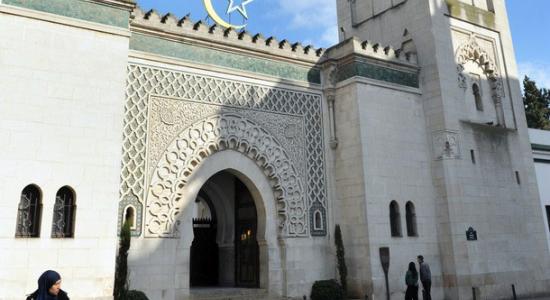Grand mosque: History Revisited
 The Grand mosque of Paris – An oasis of peace and calm amongst the mad Parisian life out there. The Grand mosque stood up; majestically among the other typical Parisian architecture; symbolic of the colonial past in France and of the religiosity of ever so embarrassed secular Parisians. Irony could not escape my critical eyes.
The Grand mosque of Paris – An oasis of peace and calm amongst the mad Parisian life out there. The Grand mosque stood up; majestically among the other typical Parisian architecture; symbolic of the colonial past in France and of the religiosity of ever so embarrassed secular Parisians. Irony could not escape my critical eyes.
Built as a hybrid of North African Islamic styles, the imposing structure had a strikingly serene atmosphere. The sun-trenched garden with fountains against the backdrop of the background proudly stands a thirty three-meter high minaret. The internal courtyards, lined with Andalusian mosaics, were offset by dark eucalyptus and cedar trim.
With its tiled fountain and diverse flora, the first courtyard exuded peace and harmony. The inner garden is lined with fig trees and more fountains. Brass chandeliers draped down from carved wooden ceiling with plaster carvings and arches. We proceeded from one courtyard to another . Walls were all decorated with intricate calligraphy.
As I settled down with my daughters I was deeply contemplating the essence of this mosque. The children, equally moved by the atmosphere, were unusually silent, imbibing the beauty and serenity of the space. The old caretaker for some reason really fussed over us, bringing us Bakalava and some mint teas. Apparently The Grand Mosque of Paris was opened in 1926 on land donated by the French Government in tribute to many Muslims of her North African colonies who fought and died for France in the World War I. At that time, most of the mosque’s members were Berbers from Kabylia in Algeria.
Still my mind went and relived the extra ordinary stories of French-Algerian Muslim compassion and bravery that fittingly took place in this mosque. The story goes back to 1940, when the Nazis invaded Paris. The Nazis were busy tracking down the Jews for deportation. Then Imam of the mosque, Si Kaddour Bengharrit, knew that the Muslim community could do something to help the Jews – they had both the space and the means to do this. Compassionate and merciful the Muslims of the Grand Mosque began to rescue the Jews.
Soon the Imam came under the radar of the Nazis and warned against helping people escape to safety.( ref: The Grand Mosque of Paris: A Story of How Muslims Saved Jews During the Holocaust by Karen Gray Ruelle and Deborah Durland DeSaix). I tried to remember many true life characters I read in that book. One such person was Salim Halali, a Berber Jew from Algeria, studying in Paris to become a singer. Salim found refuge in the mosque and received a “Certificate of Conversion” from the Imam. The Imam even had a stonecutter called in to carve a false gravestone with Salim’s family name on it for authenticity. Salim remained at the mosque until the war was over. Those Jews who also looked North African were able to stay in the mosque for more than a few days, since it was easy for them to pass as Muslims. Those who did not look North African had to be guided out to safety as quickly as possible.
The Muslims had a real advantageous position as far as the Nazis were concerned. Though the mosque was suspected of helping the Jews, the Nazis didn’t target its members because they feared an uprising of Muslims in Northern Africa and the Germans were already fighting the Allies there. And on occasions when the Nazis did show up to search the mosque, the members had various ways of delaying their entrance, giving the people inside time to hide.
In addition, many Jewish children brought to the mosque were sent to Muslim clinics outside Paris to protect them from the Nazis. These clinics were run by a Tunisian physician named Ahmed Somia. There, they administered to the children as well as Allied pilots, parachutists and even spies who found themselves injured and trapped in France.(ref Ruelle and DeSaix).Countless other heroic endeavours of those Muslims flashed through my mind.
By then mosque had got filled with the faithful. French Muslim women mainly of Algerian origin smiled politely when our eyes met cueing Salam at times and carried on listening intensely to the Friday sermon. Imam’s speech in French rendered no meaning to my Indian ears. However the gentle breeze and sweet scents of the Arabian Oudh mixed with that of French lilies made a perfect sense to this extraordinary place amidst an otherwise ordinary Paris.






















Connect
Connect with us on the following social media platforms.